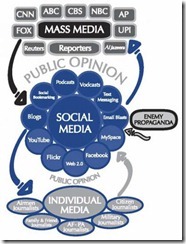Writes Mac Slavo
Amid significant pressure from tens of thousands of internet users and major web behemoths like Google, Facebook, and Reddit, the Stop Online Piracy Act (SOPA) is, in its current form, Dead on Arrival:
“Misguided efforts to combat online privacy have been threatening to stifle innovation, suppress free speech, and even, in some cases, undermine national security. As of yesterday, though, there’s a lot less to worry about.
“The first sign that the bills’ prospects were dwindling came Friday, when SOPA sponsors agreed to drop a key provision that would have required service providers to block access to international sites accused of piracy.
“The legislation ran into an even more significant problem yesterday when the White House announced its opposition to the bills. Though the administration’s chief technology officials officials acknowledged the problem of online privacy, the White House statement presented a fairly detailed critique of the measures and concluded, “We will not support legislation that reduces freedom of expression, increases cybersecurity risk or undermines the dynamic, innovative global Internet.” It added that any proposed legislation “must not tamper with the technical architecture of the Internet.”
…
“Though the administration did issue a formal veto threat, the White House’s opposition signaled the end of these bills, at least in their current form.
“A few hours later, Congress shelved SOPA, putting off action on the bill indefinitely.
“Sourced From Washington Monthly via The Daily Sheeple
Sponsored primarily by purported free speech advocates that include democrats and republicans alike, the SOPA would have fundamentally transformed the internet as we know it today. As Daisy Luther writes at Inalienably Yours, the bill was nothing short of a direct attack against the first Amendment and the right to free speech:
“On closer inspection, the legalese in the bill has the potential to eviscerate free speech….and like NDAA, without proof…only with suspicion of “wrong-doing”. It’s all about copyright infringement. If you tick off the powers that be, and you’ve quoted someone, somewhere, saying something, you may have infringed on their copyright. As a defendant, you are not even present at the legal proceeding allowing “them” to shut you down until you prove yourself innocent.
“How do they shut you down? Search engines are required to remove you from their listings. Internet Service Providers can be ordered to block access to your site. Advertising networks and payment providers can also be forced to cease doing business with you. This continues until you are proven INNOCENT. Wait – I thought it was innocent until proven guilty….oh….that was “before” the NDAA.
Source: The Internet: The Last Bastion of Free Speech
While this bill of goods was being sold to the American public as a way to reduce online piracy originating on foreign shores, in essence the legislation would have made it possible for any organization (with the financial assets and access to attorneys to do so) to target web sites (foreign or domestic) using excerpts, quotes, and videos without express permission of the authors or producers of such content. Furthermore, any web site linking to suspected copyrighted content would be guilty by association for fascilitating the infringement.
Read the rest here
In the growing realization that political power is being frayed by the ongoing information age revolution or the democratization of knowledge, the 20th century welfare and warfare state will use anything, like Intellectual Property and copyright arguments, as pretext to rein control over the internet. Earlier they argued that the cyberspace can pose a threat to national security.
Today, Wikipedia and other websites has shut down to express their opposition to proposals over censorship masquerading as ‘foreign Internet Piracy’.
The above is just one of the other being actions undertaken such as Spying of Email and the harassment of Wikileaks
As I previously wrote
These actions represent “resistance to change”, whereby politicians will try to enforce information control or censorship in the way the industrial age used to operate.
The horizontal flow of information threatens the institutional centralized frameworks built upon the industrial age economy.
As I earlier wrote,
“Political and economic ideology latched on a vertical top-bottom flow of power will be on a collision course with horizontal real time flow of democratized knowledge.
“This would likely result to less applicability of ideologies based on centralization, which could substantially erode its support base and shift political capital to decentralized structure of political governance that would conform with the horizontal structure of information flows.
“People will know more therefore control from the top will be less an appealing idea.
But again these attempts to regulate the web are likely to fail.
Nevertheless the war on the internet accounts as part of the adjustment process away from the command and control structure of the industrial ages with the knowledge revolution taking place beyond the reach of politicians. Besides, technological advances will work around regulations.
Signifying the foundation of knowledge, the internet will serve as THE battleground between socialism and free markets, and this will be just one of the many series of skirmishes that are destined to occur. And as previously noted, many internet activists have already been preparing for the worst scenario.
Indexed’s Jessica Hagy has a nice graphical depiction of the ongoing war, which she calls: Dark Ages II: in discussion now!

Indeed, the left and vested interest groups wants us to remain in the Dark ages and as their serfs.


